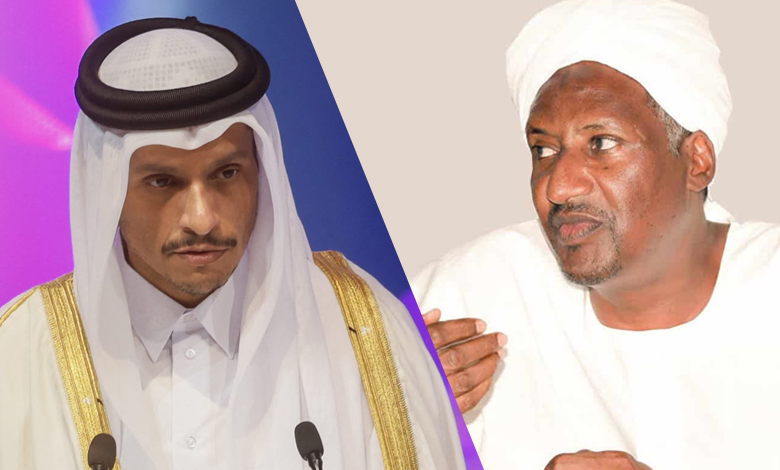Leaks about the presence of Abdul Rahim Daglo in Qatar to meet the Qatari Prime Minister

Abdul Rahim Hamdan Daglo, Deputy Chief of “Rapid Support Forces,” is scheduled to arrive in Qatar to meet with the Qatari Prime Minister and Minister of Foreign Affairs, Mohammed Abdulrahman Al Thani, along with several officials from the Qatari government. This visit comes under undisclosed circumstances and aims to hold discussions about the current situation in Sudan.
This visit also aims to strengthen diplomatic relations between the Rapid Support Forces and Qatar, with Qatar providing support either financially through aid or diplomatically through mediation, given Qatar’s historical relationship with the leaders of the Muslim Brotherhood army and its association with the general organization of the Muslim Brotherhood.
Qatari investments in Sudan are estimated at around 3.8 billion dollars, according to the Sudanese Ministry of Investment, with Qatar ranking fifth among countries investing in the country.
History of relations between Qatar and the Rapid Support Forces: “Hemeti’s visit to Qatar.”
Mohammed Hamdan Daglo “Hemeti,” Deputy Chairman of the Sovereignty Council of Sudan, said that his talks with the Qatari leadership would positively impact the future of relations between the two countries.
He previously wrote on his Facebook page: “We have returned to the country after a successful visit to the sisterly state of Qatar.”
He added, “During our visit, we discussed the future of relations between the two countries and common issues.”
He continued, “Our discussions with the Qatari leadership were fruitful and constructive, and their results will be reflected in the future of relations between the two countries.”
During the visit, Hemeti met with the Amir of Qatar, Sheikh Tamim bin Hamad Al Thani, and several officials from the Qatari government.
Hemeti’s visit to Doha comes as part of a diplomatic campaign implemented by Khartoum to clarify its position to Arab and African countries regarding the stalled negotiations of the Ethiopian Renaissance Dam and the border tensions with Ethiopia.
Continuation of the Battles
Fierce battles continue between the Sudanese army and the Rapid Support Forces in various areas of Khartoum and Omdurman. Eyewitnesses reported hearing explosions and gunfire in the streets, and in confirmation of the intensity of the clashes, they observed warplanes targeting civilians and sites of the Rapid Support Forces led by Mohammed Hamdan Daglo.
Human rights organizations have confirmed that the clashes, which began on April 15, have resulted in the deaths of at least 676 people and injuries to 5,500 others. More than 700,000 people have been internally displaced within Sudan, and over 200,000 others have fled to neighboring countries as refugees.
Arab and International Mediation
In an attempt to stop the fighting and avoid a humanitarian catastrophe, the United States and Saudi Arabia are mediating between the Sudanese army and the Rapid Support Forces. The U.S. State Department said it is overseeing negotiations in Jeddah in order to achieve a short-term ceasefire to enable humanitarian aid delivery to those affected.
In this context, the “Jeddah Declaration” was signed by representatives of the army and the Rapid Support Forces with the aim of achieving a ceasefire to allow civilians to leave conflict zones and to provide them with humanitarian aid. However, the ceasefire has been violated, with accusations exchanged between the conflicting parties regarding responsibility for the violations.
The United Nations and the international community express deep concern about the situation in Sudan and seek to mediate to halt the ongoing conflict and achieve peace and stability in the region. However, achieving a ceasefire and ending the conflict depends on the cooperation of all relevant parties and their willingness to engage in dialogue and peaceful settlement.
Solutions to the Crisis
In an attempt to find a solution to the crisis, several international and local initiatives have emerged in recent days to bring together the conflicting parties in Sudan.
Among these initiatives is the United Nations’ call through its mission “UNITAMS” for political consultations among Sudanese parties, and the offer of mediation by the organization “IGAD” in negotiations between actors in the country, as well as an initiative from South Sudan to continue the role of mediation between the army and the Rapid Support Forces.
Eritrea also proposed an initiative to bridge the gap between the political factions in Sudan, and the Arab League received an initiative from prominent Sudanese civilian figures under the title “National Initiative to Resolve the Sudanese Crisis.”
National Initiative
Within the country, directors of Sudanese universities proposed an initiative for national reconciliation, while elements of the National Umma Party and several political figures lead similar movements towards ending the crisis.
However, despite the abundance of initiatives, their success depends on the willingness and agreement of the parties involved in the conflict to seek a peaceful and democratic resolution.
Possible Paths to Achieve Peace
National Dialogue: The transitional government in Sudan called for a national dialogue since the intensification of protests in 2019. This dialogue aims to involve all parties in formulating a shared vision for democracy, development, and justice. However, some opposition forces like the Sudanese Professionals Association and the Declaration of Freedom and Change reject this path, demanding the complete downfall of the regime.
International Mediation: Some countries and organizations offer mediation to bridge the gap between the conflicting parties in Sudan. For example, South Sudan plays a role in peace negotiations in Juba, the International Group for Law and Public Policy holds meetings in Paris with Sudanese leaders, and Eritrea proposed a dialogue initiative.
These paths require a strong influence on the crisis parties to convince them to abandon their hardline positions, as well as coordination with local initiatives proposed by prominent Sudanese figures, university directors, or the National Umma Party.












